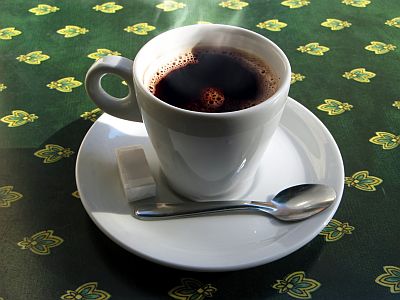Research results that working memory can be boosted by doing 'light aerobic exercise' instead of ingesting caffeine

Some people would wake up in the morning with a drowsiness coffee, make their heads crunchy and start the day. However, it has been pointed out that caffeine contained in coffee and tea has not only advantages but also
Effects of Caffeine and Acute Aerobic Exercise on Working Memory and Caffeine Withdrawal | Scientific Reports
https://www.nature.com/articles/s41598-019-56251-y
Coffee versus cardio: Can exercise offer the same mental boost as caffeine?
https://theconversation.com/coffee-versus-cardio-can-exercise-offer-the-same-mental-boost-as-caffeine-132162

Caffeine contained in coffee has positive effects such as arousing consciousness, raising energy and mood, while some people experience side effects such as
Morava and colleagues are studying the various health benefits of aerobic exercise, with results showing that aerobic exercise improves ' working memory, ' a measure of cognitive ability. Working memory refers to the ability to complete various tasks while temporarily storing information, and is the ability to influence performance in situations closely related to daily life such as school and work. Since improvement in working memory can also be obtained by caffeine intake, Morava's research team investigated whether caffeine intake could be replaced by aerobic exercise.

For healthy adults, the research team said, 'If you walk actively on a treadmill for 20 minutes' and 'If you take an amount of caffeine equivalent to one coffee poured in a small cup', We confirmed by experiments how different the effects on working memory are.
As a result of the experiment, it was found that the improvement in working memory observed when performing moderate aerobic exercise was similar to that when ingesting one cup of coffee of caffeine. In other words, research suggests that performing aerobic exercise instead of drinking coffee to improve your head not only improves cognitive performance to the same degree as drinking coffee, but also benefits from aerobic exercise. I heard that.

To further explore issues related to caffeine, exercise, and cognitive ability, the research team also focused on people with caffeine withdrawal symptoms. The research team said that people who routinely take caffeine had to refrain from taking caffeine for 12 hours and intentionally caused withdrawal symptoms of caffeine poisoning. People who visited the lab after 12 hours of caffeine sickness reported withdrawal symptoms of caffeine addiction, including fatigue, poor concentration, depressed mood, lack of motivation, and headaches. On the other hand, the withdrawal symptoms of caffeine poisoning did not affect the working memory of subjects.
Next, the research team asked people with caffeine withdrawal symptoms to perform the task of 'walking actively for 20 minutes.' It was then found that, intriguingly, active aerobic exercise reduced the withdrawal symptoms of caffeine addiction, especially improving fatigue and mood depression.
The reason why aerobic exercise improves working memory and alleviates the withdrawal symptoms of caffeine poisoning is still under investigation. In previous studies , increased blood flow in the brain after exercise and increased release of hormones such as dopamine and adrenaline in addition to neurotrophic factors that feed neurons contributed to improved cognitive performance. It has also been suggested that there is a possibility that mood improvement may be the result of such brain activity.
'These findings are encouraging, suggesting that simple tasks such as a brisk walk during lunch breaks may help reduce the energy drop in the afternoon,' Morava and colleagues commented. He argued that people who want to refrain from drinking coffee may benefit from caffeine and improve their health by doing aerobic exercise.

Related Posts:







